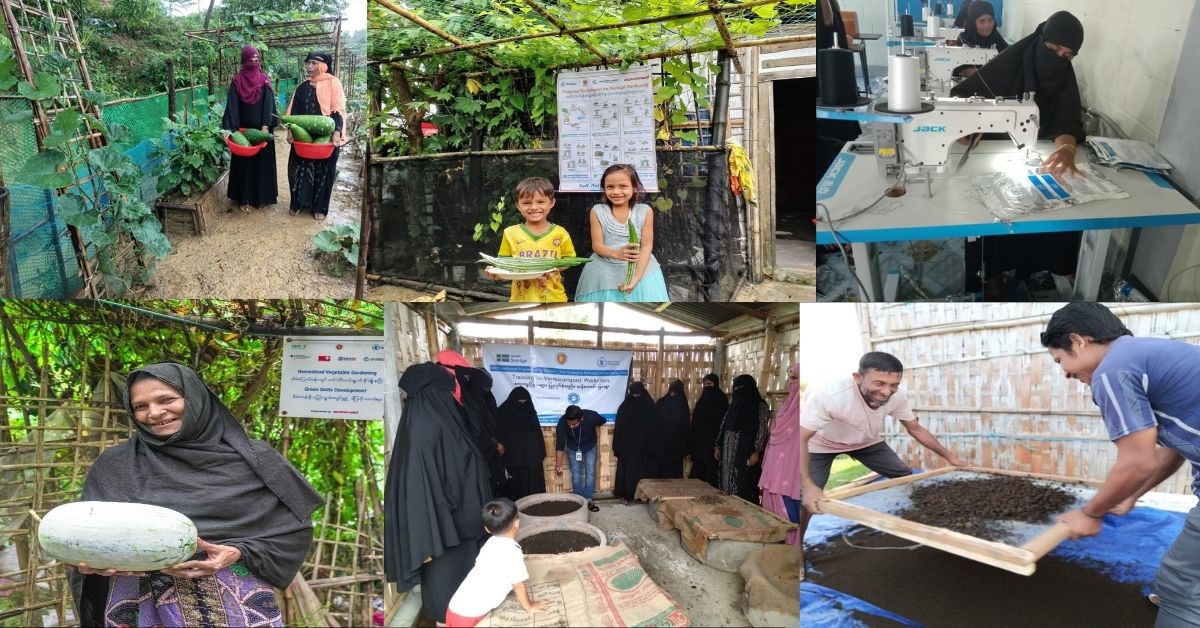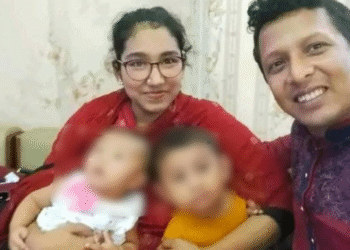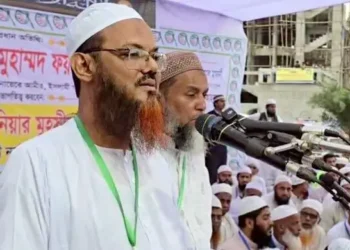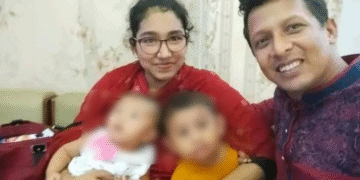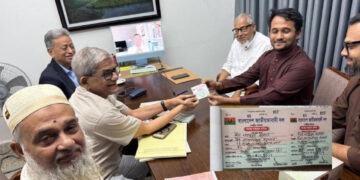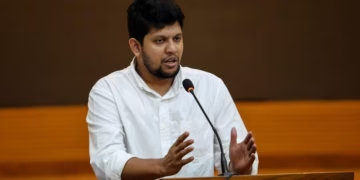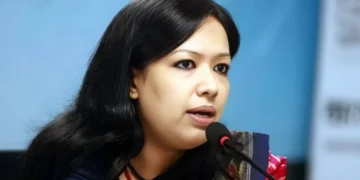Rohingya Refugees Turn to Homestead Gardening Amid Food Aid Cuts by Help of World Food Programme
In Cox’s Bazar, thousands of Rohingya families are slowly turning their lives around not just by receiving food, but by learning how to grow it. With rising global food insecurity and limited humanitarian funding, the challenge of sustaining the nearly one million Rohingya refugees in the world’s largest refugee settlement in Cox’s Bazar has become more urgent than ever.
To respond to this growing crisis, the United Nations World Food Programme (WFP) is in partnership with key national and international development organizations, has taken a proactive step empowering refugees to grow their own food.
Amid reduced food rations due to donor shortfalls, the WFP is working with ActionAid Bangladesh, CARE Bangladesh, Cordaid, and Prottyashi to train Rohingya families in sustainable food production and waste management. With support from the Food and Agriculture Organization of the United Nations (FAO Bangladesh) and coordination from the Office of the Refugee Relief and Repatriation Commissioner (RRRC), this initiative aims to reduce dependency on aid and build food resilience in the camps.
Turning Crisis Into Opportunity
The Rohingya community, forcibly displaced from Myanmar and living in cramped camps since 2017, remains largely dependent on humanitarian assistance. However, the humanitarian funding gap has forced organizations like WFP to slash monthly food assistance from USD 12 per person to just USD 8. This cut has deeply impacted food security, nutrition, and overall well-being within the camps.
In response, WFP and its partners have rolled out a multifaceted approach to help refugees begin growing their own food and better manage available resources. Through hands-on training, families are learning to cultivate home gardens, raise fish, grow mushrooms, create compost from waste, and even repurpose waste into usable products a strategy that not only addresses hunger but also promotes environmental sustainability and community resilience.
Life in the World’s Largest Refugee Camp
The Rohingya are a predominantly Muslim ethnic minority from Rakhine State in western Myanmar (formerly Burma). For decades, they have faced systematic discrimination, statelessness, and violence in their homeland. The Myanmar government does not recognize the Rohingya as citizens, rendering them stateless under national law, despite generations of their presence in the country.
Today, Bangladesh hosts approximately 950,000+ Rohingya refugees, mostly in makeshift shelters within overcrowded camps like Kutupalong and Balukhali collectively the largest refugee settlement in the world.
Life in these camps is marked by:
-
Cramped living conditions with limited access to clean water, healthcare, or formal education
-
Restricted freedom of movement and little to no formal employment
-
Reliance on humanitarian aid for food, shelter, and survival
-
Frequent fire hazards, floods, and landslides due to poor infrastructure and deforestation
-
Psychological trauma, particularly among children, from witnessing violence and displacement
Despite these challenges, the Rohingya community has shown resilience, forming informal schools, religious spaces, and even small businesses within the camps.
Homestead Gardening and Beyond
At the heart of this initiative is homestead gardening. Families are being taught how to grow vegetables in small spaces using locally available resources such as plastic bottles, sacks, and bamboo baskets. These gardens contribute significantly to their daily nutrition, especially at a time when aid is stretched thin.
In parallel, the introduction of fish farming and mushroom cultivation is providing much-needed protein sources, while composting practices are helping households create organic fertilizer, reduce waste, and maintain healthier environments. Waste materials like plastics and packaging are also being upcycled into tools, crafts, and functional items through community workshops.
A Collaborative Network of NGOs
This transformation is being made possible through a strong network of experienced NGOs.
-
ActionAid Bangladesh is focused on empowering refugee women to lead homestead gardening efforts and manage composting.
-
CARE Bangladesh brings expertise in nutrition-sensitive agriculture and community-based resource management.
-
Cordaid works on improving livelihoods through integrated skill-building and market linkage approaches.
-
Prottyashi, a Cox’s Bazar-based NGO, has been instrumental in community mobilization and practical training delivery.
These organizations, in coordination with WFP and FAO Bangladesh, ensure that the solutions are locally adapted, culturally acceptable, and inclusive.
Helping Families Grow Their Own Food
Many Rohingya families now have small gardens beside their shelters. With training from those organizations they are growing vegetables like pumpkins and bottle gourds. These gardens use very small spaces and simple tools.
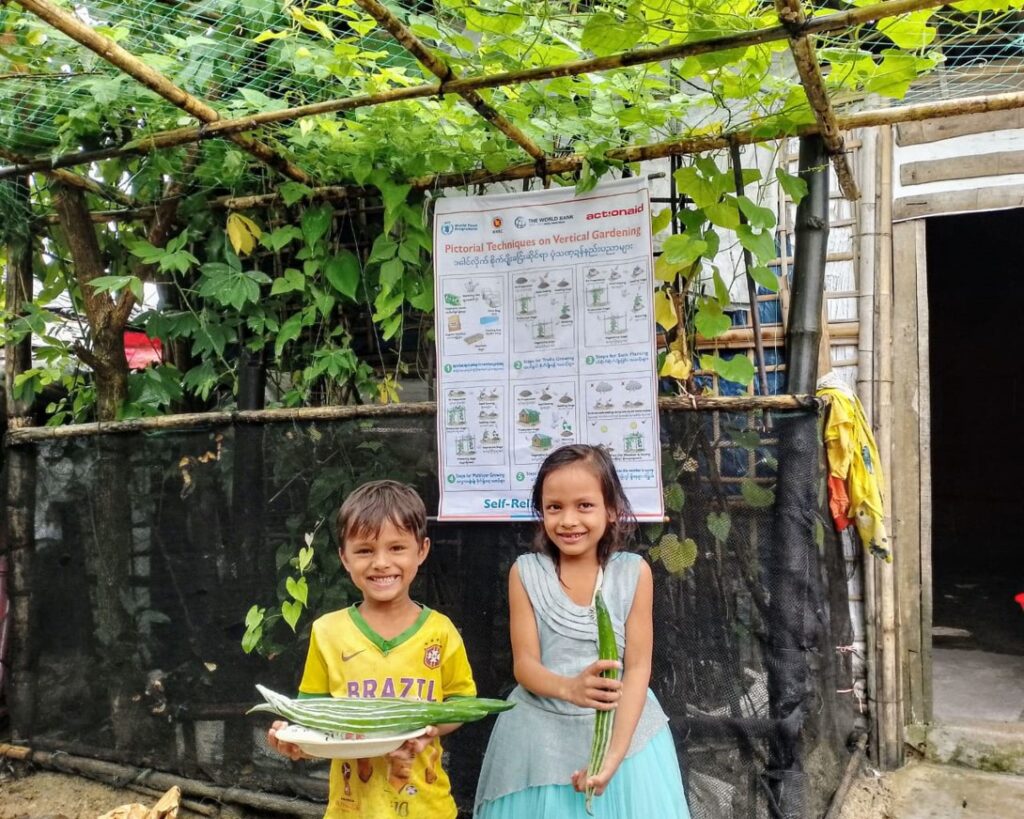
This helps families eat fresh, healthy food. It also saves money and reduces the need to buy food from the market.
Teaching Skills That Last
Besides gardening, families are also learning how to:
-
Grow crops for food and income
-
Raise fish in small ponds
-
Make compost from kitchen waste to use as fertilizer
-
Reuse old materials to make useful items
-
Sew clothes using machines
In one of the pictures, women are learning how to use sewing machines. This gives them a chance to earn money and become more independent. In another photo, men are learning how to make compost, which helps the soil and reduces waste.
These skills are not just for today. They are helping people prepare for a better future.
Giving Hope to Women and Children
Women are leading many of these activities. They are planting, learning, and teaching others. For many of them, this is the first time they have worked outside the home or earned something by themselves.
Children are also learning by watching their parents. Some are even helping in the garden or learning how to take care of fish. This builds confidence and teaches them how to live in a healthy, strong way.
Read More Nasiruddin Patwari: “The election is being brought forward to please a particular group”
Making the Camps Cleaner and Greener
Another part of this project is teaching people how to keep their area clean. Waste from homes is now being turned into compost or reused to make bags and other items. This protects the environment and creates new ways to earn money.
Working Together for a Better Life
This program is supported by FAO Bangladesh and works closely with the Office of the Refugee Relief and Repatriation Commissioner (RRRC) in Cox’s Bazar. The idea is simple that when people have the right training and support, they can take care of themselves.
They don’t have to depend fully on food aid. Even though the refugees have lost everything, these small steps planting a garden, sewing a bag, raising fish and give them strength and hope.
Long-Term Strategy to Address Food Crisis
The immediate goal is to reduce the reliance on external food aid. But the longer-term strategy focuses on creating a pathway to self-reliance. This includes:
-
Promoting food production at household and community levels
-
Strengthening skills in agriculture and waste management
-
Facilitating access to fresh, nutritious food beyond basic staples
-
Preparing the community for climate-resilient farming techniques
-
Fostering community-based models that can be replicated in other humanitarian settings
The involvement of women in gardening and composting not only boosts household nutrition but also builds dignity and social cohesion. Families that were once solely dependent on monthly food rations are now cultivating enough produce to supplement meals, exchange with neighbors, and in some cases, sell small surpluses within informal networks inside the camps.
A Step Towards Self-Reliance
The World Food Programme is showing that with care and training, people can rise even in the hardest conditions. For the Rohingya families, this is more than just learning how to grow food. It’s about regaining control of their lives.
These efforts may look small, but they are building something very big a stronger, more independent community that can face the future with hope.
The Rohingya food crisis is not just about hunger, it is about sustainability, equity, and dignity. Solutions must balance short-term emergency aid with long-term development thinking. By equipping Rohingya families with practical agricultural knowledge and tools, WFP and its partners are laying the groundwork for a future where these communities can feed themselves, even in one of the world’s most complex refugee environments.
As global humanitarian resources become increasingly strained, such community-centered, capacity-building approaches offer a beacon of hope and a replicable model for food crisis response around the world.
Share via:

